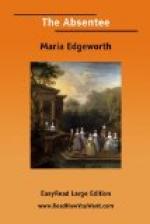Sir James Brooke, to whom Lord Colambre, without giving up his authority, mentioned the fact, declared that he had no doubt the thing had happened precisely as it was stated; but that this was one of the extraordinary cases which ought not to pass into a general rule—that it was a slight instance of that influence of temporary causes, from which no conclusions, as to national manners, should be drawn.
‘I happened,’ continued Sir James, ’to be quartered in Dublin soon after the Union took place; and I remember the great but transient change that appeared. From the removal of both Houses of Parliament, most of the nobility, and many of the principal families among the Irish commoners, either hurried in high hopes to London, or retired disgusted and in despair to their houses in the country. Immediately, in Dublin, commerce rose into the vacated seats of rank; wealth rose into the place of birth. New faces and new equipages appeared; people, who had never been heard of before, started into notice, pushed themselves forward, not scrupling to elbow their way even at the Castle; and they were presented to my lord-lieutenant and to my lady-lieutenant; for their excellencies, for the time being, might have played their vice-regal parts to empty benches, had they not admitted such persons for the moment to fill their court. Those of former times, of hereditary pretensions and high-bred minds and manners, were scandalised at all this; and they complained, with justice, that the whole tone of society was altered; that the decorum, elegance, polish, and charm of society was gone; and I among the rest (said Sir James) felt and deplored their change. But, now it is all over, we may acknowledge that, perhaps, even those things which we felt most disagreeable at the time were productive of eventual benefit.
’Formerly, a few families had set the fashion. From time immemorial everything had, in Dublin, been submitted to their hereditary authority; and conversation, though it had been rendered polite by their example, was, at the same time, limited within narrow bounds. Young people, educated upon a more enlarged plan, in time grew up; and, no authority or fashion forbidding it, necessarily rose to their just place, and enjoyed their due influence in society. The want of manners, joined to the want of knowledge in the new set, created universal disgust: they were compelled, some by ridicule, some by bankruptcies, to fall back into their former places, from which they could never more emerge. In the meantime, some of the Irish nobility and gentry who had been living at an unusual expense in London—an expense beyond their incomes—were glad to return home to refit; and they brought with them a new stock of ideas, and some taste for science and literature, which, within these latter years, have become fashionable, indeed indispensable, in London. That part of the Irish aristocracy, who, immediately




